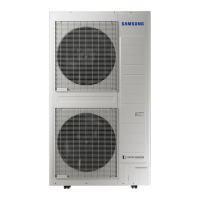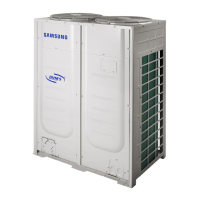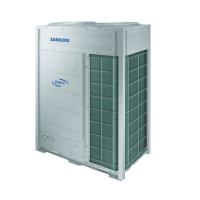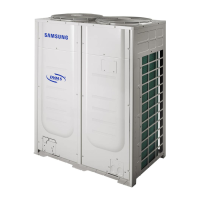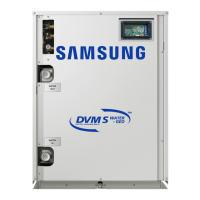AA
44
Insulating the refrigerant pipes and branch joints
Check for gas leakage before completing (the hose and pipe insulation) and if there is no sign of leakage, make sure to
insulate the pipes and hoses.
Use EPDM material insulator that meets the following conditions.
Test item Unit Standard
Density g/cm
3
0.048~0.096
Dimensional change rate by heat % Below -5
Absorption rate g/cm
3
Below 0.005
Thermal conduction rate W/m·K Below 0.037
Moisture transpiration factor ng/(m
2
·s·Pa) Below 15
Moisture transpiration grade g/(m
2
·24h) Below 15
Formaldehyde dispersion mg/L There should be none
Oxygen rate % Over 25
Pipe insulation
Insulate the gas pipe and liquid pipe by referring to the thickness of insulator for each pipe size.
The standard condition is; temperature at 30°C, humidity less than 85%. If case if the humidity is higher, you must
increase the size by one grade as stated in below table.
Pipe
Diameter of refrigerant
pipe (mm)
Insulator (cooling & heating)
RemarksGeneral [30
˚C
,85%]
High humidity
[30
°C, over 85%]
EPDM, NBR
Liquid pipe
Ø6.35~Ø9.52 9t 9t
Heating resisting
temperature over
120
°C
Ø12.7~Ø50.80 13t 13t
Gas pipe
Ø6.35 13t 19t
Ø9.52~ Ø22.23 19t 25t
When installing insulation in places and conditions below, use the same insulation that is used for high humidity
conditions.
<Geological condition>
- High humidity places such as shoreline, hot spring, near lake or river, and ridge (when the part of the building is
covered by earth and sand.)
<Operation purpose condition>
- Restaurant ceiling, sauna, swimming pool etc.
<Building construction condition>
- The ceiling frequently exposed to moisture and cooling is not covered. (e.g. The pipe installed at a corridor of a
dormitory and studio or near an exit that opens and closes frequently.”)
- The place where the pipe is installed is highly humid due to the lack of ventilation system.
Selecting the refrigerant pipe insulator
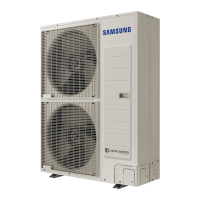
